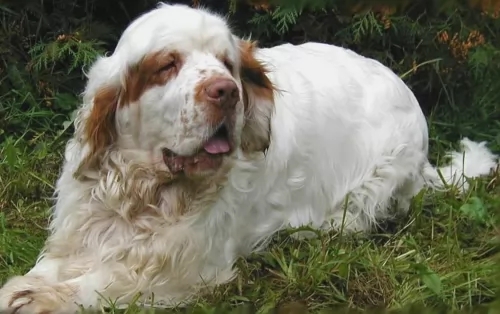 Petzlover
Petzlover Braque Saint-Germain is originated from France but Clumber Spaniel is originated from United Kingdom. Braque Saint-Germain may grow 11 cm / 5 inches higher than Clumber Spaniel. Both Braque Saint-Germain and Clumber Spaniel are having almost same weight. Braque Saint-Germain may live 3 years more than Clumber Spaniel. Both Braque Saint-Germain and Clumber Spaniel has same litter size. Braque Saint-Germain requires Low Maintenance. But Clumber Spaniel requires High Maintenance
Braque Saint-Germain is originated from France but Clumber Spaniel is originated from United Kingdom. Braque Saint-Germain may grow 11 cm / 5 inches higher than Clumber Spaniel. Both Braque Saint-Germain and Clumber Spaniel are having almost same weight. Braque Saint-Germain may live 3 years more than Clumber Spaniel. Both Braque Saint-Germain and Clumber Spaniel has same litter size. Braque Saint-Germain requires Low Maintenance. But Clumber Spaniel requires High Maintenance
 The Braque Saint-Germain, also known as the St. Germain Pointing Dog, is a French creation. The French pointing dogs and the English pointing dogs were mixed to develop the Braque Saint-Germain. He is a versatile hunting dog that was both a pointer and a gun dog. They are medium to large in size and went from being bred by royalty in the 1830’s to a popular everyday hunting dog. The ancestry of the breed can be traced back many additional centuries.
The Braque Saint-Germain, also known as the St. Germain Pointing Dog, is a French creation. The French pointing dogs and the English pointing dogs were mixed to develop the Braque Saint-Germain. He is a versatile hunting dog that was both a pointer and a gun dog. They are medium to large in size and went from being bred by royalty in the 1830’s to a popular everyday hunting dog. The ancestry of the breed can be traced back many additional centuries.
As popular as the Braque Saint-Germain was as a hunter, he gained his notoriety in the show ring. The first time a Braque Saint-Germain entered the ring in 1863 it was an acclaimed breed and upstaged all other pointing breeds. The French Braque Saint-Germain club was opened in 1913 and recognized by the Federation Cynoloqique International (FCI) and in 2006 was recognized by the North American United Kennel Club. Their popularity has risen and fallen since World War II. It has flirted with extinction more than once. Today’s Braque Saint-Germain is a highly talented hunting dog with a standard appearance that still does well in the ring.
The English Pointer was a cross between the hound dogs, British gundog, Spanish Pointer and herding breeds. This made the English Pointer a very versatile breed before it was crossed with the Braque Francais Gascogne. The Braque Francais Gascogne itself is believed to have developed from the Chien d-Oysel and Italian and Spanish pointing dogs. The English Pointer was specialized in pointing and the French Braque Francais Gascogne was a very versatile dog. In the Braque Saint-Germain the dog world has a versatile, excellent pointing dog.
In the 1800’s the French Crown was gifted with two English Pointers that were great at hunting. Some considered the English Pointers to be better than any of their Braque Francais. The female of these two pointers was bred many times but the male died without breeding. The female’s first litter was with a brown German Spaniel and were of low quality. Her second litter however was with an outstanding bird dog and produced 7 excellent puppies. Because of this these two dogs were bred several more times. The owner of the adult dogs moved to Saint-Germain, where their appearance attracted many hunters. The breed flourished here and was named the Braque Saint-Germain.
Soon corrupt individuals sold non-purebreds as Braque Saint-Germains and handlers showed these dogs under the Saint-Germain name. There are always dangers when a popular breed’s beginnings comes from only two dogs. In 1913 the new breed club fought over the standard and ended up producing two types. The first type was a sturdy dog with long ears and a round chest. He was larger and slower than his cousin. The second type was a smaller dog with a finer skeleton and short, high set ears. He was a galloper to his cousin’s trot.
The breed found itself facing near extinction in 1914 and during all of World War I. Dogs were not bred and many were not properly cared for. The breed became quite rare. Then as it began to recover, the Second World War intervened and devasted the breed again. By the end of the war, they were once again very rare and on the edge of extinction. It took a dedicated effort from local breeders to bring the breed back. By the 1950’s the two types of Braque Saint-Germain dogs were molded into only one breed. There remained a conflict between those that bred show dogs and those that bred hunting dogs.
Slowly the breed grew in number and in the late 1990’s there were over 100 puppies registered into the club every year. More than 100 were entered into the clubs in 2009. There have also been a few English Pointer crosses allowed to breed with the Braque Saint-Germains in order to grow and improve the gene pool. Still the breed is exceedingly rare outside of France. Through it all the breed has been able to maintain its place in confirmation and still be a versatile hunting dog.
 Ever since winning in Confirmation at Westminster Kennel Club’s annual show, the popularity of the Clumber Spaniel has increased markedly. The breed of Clumber Spaniel comes from the United Kingdom and it is the largest of all the spaniels. The breed is named for the Clumber Park where it was developed in Nottinghamshire. The Clumber Spaniel a=was designed to be a gundog or hunter in heavy weeds or cover. They have been popular with the Royal Family and were kept by King George V, King Edward VII, and Prince Albert.
Ever since winning in Confirmation at Westminster Kennel Club’s annual show, the popularity of the Clumber Spaniel has increased markedly. The breed of Clumber Spaniel comes from the United Kingdom and it is the largest of all the spaniels. The breed is named for the Clumber Park where it was developed in Nottinghamshire. The Clumber Spaniel a=was designed to be a gundog or hunter in heavy weeds or cover. They have been popular with the Royal Family and were kept by King George V, King Edward VII, and Prince Albert.
It is possible that during the French Revolution, the Duc de Noailles gave his spaniels to the Duke of Newcastle in Nottinghamshire, These spaniels, Alpine Spaniel, are extinct. At the time they were bred with Basset Hounds and Great Pyrenees.
Another line of thought has the Clumber Spaniel descending form an ancient Bleinheim Spaniel, which was used to later develop the King Charles Spaniel.
Whichever theory is true, we know that they were first bred and improved by William Mansell. They were shown in 1859 in England. They were bred almost exclusively by nobility until the mid-19th century. Then World War 1 caused all breeding to be discontinued and the number of Clumbers declined drastically, only to be redeveloped after the was by King George V.
The Cumber won Best in Show at the prestige’s Crufts 1991 Centenary Show. When the American Kennel Club recognized the Clumber Spaniel, there were only 9 other breeds officially recognized. They came to Canada in the same year of 1884. They are also recognized by the UK Kennel Club as a Vulnerable Native Breed. A Clumber bred by Doug Johnson won Best in Show at the 1996 Westminster Dog Show.
The Clumber Spaniel is a loyal, gentle soul who is not very friendly with strangers. They shed all the time and snore loudly.
 The Braque Saint-Germain is very much a pointer and yet is a very attractive dog. They have a medium build, drop ears and a long, level tail tapered at the end. They are really distinctive looking with an athletic, lean, muscled look. The skull is round and the muzzle is the same length as the skull. Their nose is pink , their lips cover their lower jaw and their eyes are golden, round and large. The ears are set high on the head and look like they are slightly detached. The neck is long, muscular and arched, while they have deep chest. They are well proportioned, good looking dogs with a friendly facial expression. Their coat is true to the pointing dog group as it is short, smooth and white with orange markings. Dogs of any other color might be great hunting dogs but are not show dogs and should not be bred
The Braque Saint-Germain is very much a pointer and yet is a very attractive dog. They have a medium build, drop ears and a long, level tail tapered at the end. They are really distinctive looking with an athletic, lean, muscled look. The skull is round and the muzzle is the same length as the skull. Their nose is pink , their lips cover their lower jaw and their eyes are golden, round and large. The ears are set high on the head and look like they are slightly detached. The neck is long, muscular and arched, while they have deep chest. They are well proportioned, good looking dogs with a friendly facial expression. Their coat is true to the pointing dog group as it is short, smooth and white with orange markings. Dogs of any other color might be great hunting dogs but are not show dogs and should not be bred
 The Clumber Spaniel is heavy-boned, with a very large head and a square muzzle. Of all spaniels, he is the biggest. His expressive face wears a dopey, sad look and his eyes are large, shaped like leaves. The muzzle is as large as the head and his nose is square. He has freckles on his muzzle and a deep chest. His legs are straight, and his feet are solid.
The Clumber Spaniel is heavy-boned, with a very large head and a square muzzle. Of all spaniels, he is the biggest. His expressive face wears a dopey, sad look and his eyes are large, shaped like leaves. The muzzle is as large as the head and his nose is square. He has freckles on his muzzle and a deep chest. His legs are straight, and his feet are solid.
The Clumber Spaniel gives off a dignified air and despite his expressions, he is ready to play or to work at any time.
 The Braque Saint-Germain is a working dog and a show dog. They are energetic, competitive and driven. They are generally affectionate, loyal and love to cuddle with their people. They need human companionship companionship and can have severe separation anxiety when left by themselves. They love being a member of the family with children, but they are likely to knock very young children down unintentionally.
The Braque Saint-Germain is a working dog and a show dog. They are energetic, competitive and driven. They are generally affectionate, loyal and love to cuddle with their people. They need human companionship companionship and can have severe separation anxiety when left by themselves. They love being a member of the family with children, but they are likely to knock very young children down unintentionally.
The Braque Saint-Germain is a loyal, gentle breed and some might even be shy. They are not guard dogs. They are much too friendly toward strangers. Even though they were bred to point and track small game, they can be socialized to be safe living with smaller pets such as cats. They are intelligent, fast learners who love to learn. They also love to work and work long hours without fatigue. They will love to be a jogging or cycling partner.
They do best with large yards, rural areas or in hunting packs. They are not small apartment, city dwellers. They do get along with strangers and other animals. They will warn of strangers, but they are not aggressive.
 The breed has very few health issues even with all the cross breeding followed by inbreeding. Due to the small gene pool there might be some genetically inherited problems. Due to the size of the gene pool, they might suffer from “founder’s effect” where if one dog has a certain condition, their descendants could also. Not enough research has been done to know if this is the case with the Braque Saint-Germain of not.
The breed has very few health issues even with all the cross breeding followed by inbreeding. Due to the small gene pool there might be some genetically inherited problems. Due to the size of the gene pool, they might suffer from “founder’s effect” where if one dog has a certain condition, their descendants could also. Not enough research has been done to know if this is the case with the Braque Saint-Germain of not.
Some of the potential health issues that the3 Braque Saint-Germain might face include:
 The Clumber Spaniel can suffer from a variety of conditions due to its very design and genetics. Lameness early in life can be attributed to the large and fast-growing bones in the Clumber. This lameness will dissipate when the pup is fully grown. Other issues include:
The Clumber Spaniel can suffer from a variety of conditions due to its very design and genetics. Lameness early in life can be attributed to the large and fast-growing bones in the Clumber. This lameness will dissipate when the pup is fully grown. Other issues include:
Can become dehydrated and all the problems that arise from a dog being overheated and dehydrated.
Must have a caesarian section. They may also have a sensitivity to the anesthesia used in the procedure.
Hypothyroidism with ear and skin complications.
They cannot take sulfa drugs.
 This is a working dog that can run and track for miles. She needs good nutrition. Feed about 3 cups per day in one or two meals. Two meals are preferred.
This is a working dog that can run and track for miles. She needs good nutrition. Feed about 3 cups per day in one or two meals. Two meals are preferred.
As previously mentioned this breed might be susceptible to many genetic diseases or disorders but there have not been any studies to show this.
The Braque Saint Germain does not need a high amount of exercise as their energy level is medium. They still need daily exercise. They do best with a fenced off leash area to run. They love frisbee and chasing balls.
 The Clumber has a tendency to gain weight and become obese. Feed them wisely. Feed about ¼ to ½ of a cup of high quality dry dog food twice a day.
The Clumber has a tendency to gain weight and become obese. Feed them wisely. Feed about ¼ to ½ of a cup of high quality dry dog food twice a day.
This can be cervical or spinal. The discs can be bulging or ruptured. Can lead to paralysis if not treated properly.
Entropion with inward rolling of eyelid or Ectropion with outward rolling of eyelid.
The Clumber Spaniel is not the most energetic of canines. He still needs moderate exercise daily but don’t overdo it. Walks, fetch, swimming, chase or confirmation are good activities for a Clumber.